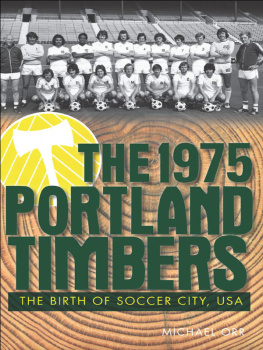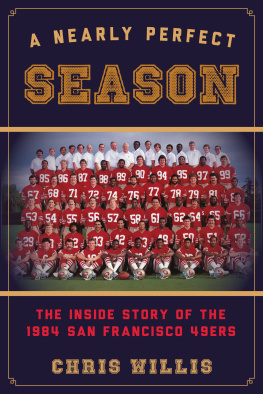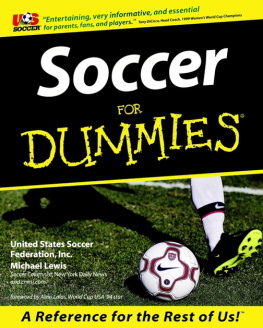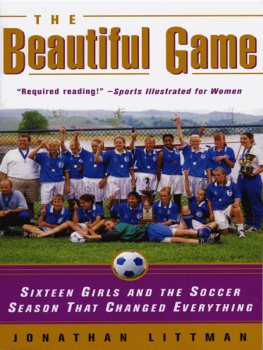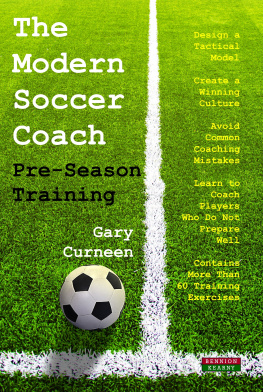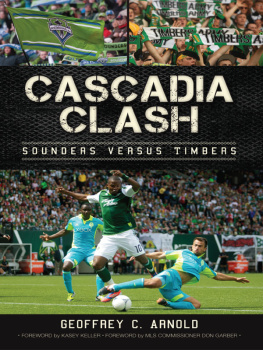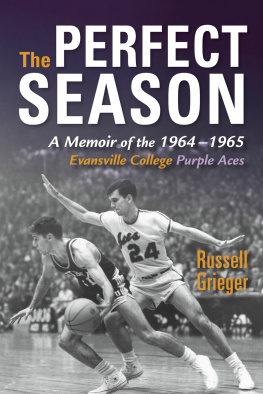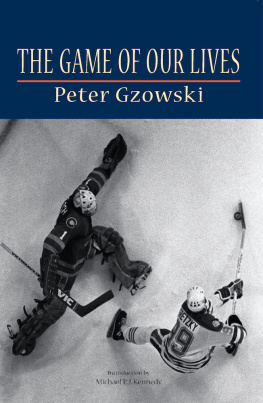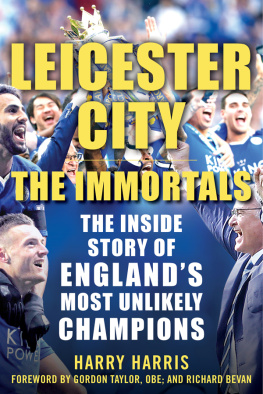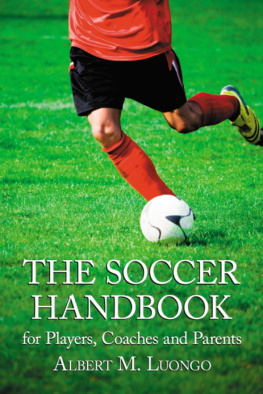
Published by The History Press
Charleston, SC 29403
www.historypress.net
Copyright 2012 by Michael Orr
All rights reserved
Cover: Portland Timbers properties courtesy of Major League Soccer, LLC.
First published 2012
e-book edition 2012
Manufactured in the United States
ISBN 978.1.61423.313.8
Library of Congress Cataloging-in-Publication Data
Orr, Michael.
The 1975 Portland Timbers : the birth of soccer city, USA / Michael Orr.
p. cm.
Includes index.
print edition ISBN 978-1-60949-466-7
1. Portland Timbers (Soccer team)--History. 2. Soccer teams--Oregon--Portland.
I. Title. II. Title: Nineteen seventy five Timbers.
GV943.6.P58O77 2012
796.3340979549--dc23
2011045620
Notice: The information in this book is true and complete to the best of our knowledge. It is offered without guarantee on the part of the author or The History Press. The author and The History Press disclaim all liability in connection with the use of this book.
All rights reserved. No part of this book may be reproduced or transmitted in any form whatsoever without prior written permission from the publisher except in the case of brief quotations embodied in critical articles and reviews
MLS and Portland Timbers do not endorse the views and opinions published on these pages and accept no responsibility for them. Views and opinions are strictly those of the author, and comments or questions regarding the content should be sent directly to the author.
For Morgen
whom I cannot live without
Contents
Acknowledgements
This book would have been impossible to conceive without the contributions in time, resources and patience from dozens of individuals across Portland, the United States and, indeed, the world.
Willie Anderson, Tony Betts, Graham Brown, Don Cox, Leo Crowther, Gisele Currier, Chris Dangerfield, Scott Daniels, Graham Day, Art Dixon, Bernie Fagan, Terry Fisher, Roger Goldingay, Linda and Mick Hoban, Vic Karsner, Jimmy Kelly, Dave Landry, Ray Martin, Nick Nicolas, Dennis OMeara, John Polis, Barry Powell, Augusto and Beatriz Proao, Jim Rilatt, Kurt Schubothe, Gary St. Clair, Dave Stoops, Jim Taylor, Stella Terry, David Tossell, Bob Wilmot and Peter Withe were all willing to chat with me, from brief notes to hours-long conversations. Their memories are the backbone of this book.
Jim Brown, David Instone, Bill Lodey and Matt Young helped me locate former players living in Great Britain. Val Ballestrem, Michael Cox, Scott Daniels and Geoff Wexler, Lauren Drury and Mike Rose, Abram Goldman-Armstrong, Mary Hansen, Dave Morrison, the Multnomah County Library, Dave Wasser and Jonathan Wilson were extremely helpful with research inquiries.
Special thanks is due to Kevin Alexander, John Bain, Josh Barrett, Eric Berg, Brian Costello, Jim Cumbes, Joe Elsmore, Mike Golub, Bill Irwin, Marsha Matthews, Scott McLaren-Moreton, Harry Merlo, Sean Moran, Ann Nolan, Fernando Proao, Robby Robinson, Jim Serrill and Kathy Smith for their assistance in many different ways throughout the life of this and related projects. And thanks to Aubrie Koenig at The History Press for talking me through the process of turning tens of thousands of words into a published book.
The Portland Timbers have been nothing but supportive of this endeavor. In meetings, conversations and correspondence they have always been open and encouraging.
As a member of FC Media, I thank Matthew Speakman and Morgen Young, as well as Steven Lenhart, for their invaluable contributions. This book was born in a Portland apartment in the summer of 2009 and has been completed only through teamwork and persistence. Without the combined efforts of FC Media, there would be no book.
And I especially thank my wife, Morgen, for supporting me with this project and my obsession with it. Beyond her listening, reading and editing, she gave me the confidence to keep writing and gave up many hours and evenings that could have been spent doing something more fun. That this has turned into a book is owed to her, and I hope shes as proud of it as I am of her work.
Introduction
On August 14, 1975, Portlanders arrived at Civic Stadium in the heart of the west side of the city. By 4:00 a.m., a line stretched southward from the ticket windows at the corner of Southwest Morrison Street and Twentieth Avenue, nearly to Southwest Taylor Street and the Bullpen Bar. Come daylight, thousands of residents of the Rose City were wrapped clear around the stadium, waiting for the chance to buy a ticket to the most anticipated sporting event in Portlands professional sporting history.
With sixty-seven seasons of minor-league baseball in Portland, an out-of-town passerby might have expected the long lines to be for a baseball game of some import. But everyone in Portland knew exactly what would take place at Civic Stadium on August 17: the Portland Timbers soccer team was hosting a North American Soccer League (NASL) semifinal against the St. Louis Stars. Despite heavy rains and lines that seemed stagnant, 33,503 Portlanders passed through the gates at Civic Stadium that day, forging the second-largest crowd in NASL history to that point.
Outfitted in plastic ponchos, the overflow crowd stomped in unison, passed their buckets of beer and cheered on their beloved Timbers. City councilwoman Mildred Schwab had arranged for every spare set of bleachers in town to be stationed as close to the pitch as possible, creating a deafening roar as the Timbers waded through deep puddles on the Tartan turf surface. St. Louiss goalkeeper, Peter Bonetti, Englands World Cup starter in 1970, was peppered with twenty-eight shots and nineteen corner kicks. A driving kick from midfielder Barry Powell found defender Graham Day, who flicked a perfectly placed ball to the head of Peter Withe, Portlands center forward. Withes nod had Bonetti well beaten and gave Portland all it would need to advance to Soccer Bowl 75, the pinnacle of soccer in the United States.
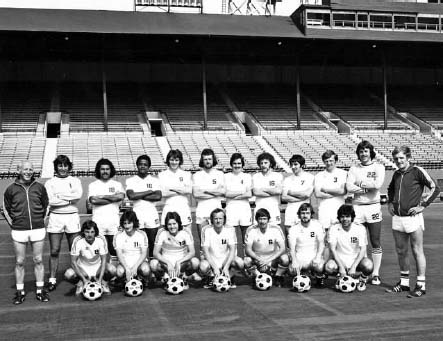
1975 Portland Timbers official team picture. Courtesy of Tony Betts, personal collection.
The sopping throngs were delirious as their magical summer came to a close, sending their boys to San Jose to contest the NASLs championship game. That scene could hardly have been imagined just four months earlier when fourteen British footballers arrived in Oregon for the inaugural season of a club called the Portland Timbers. With each passing month, soccer became more important and an event of civic consequence. The story of the original seventeen players and two coaches is the story of Portlandan experience in hard work, friendship, tolerance and achievement. Their story is one that must never be forgotten in Soccer City, USA, for all future Timbers owe that very status to the pioneers who so ably took the pitch in the summer of 1975.
Oregon Soccer, Inc., and the North American Soccer League
Major professional soccer came to North America in 1967 in the form of two leagues: the United Soccer Association (USA), which brought entire foreign clubs to North America to play a summer schedule, and the National Professional Soccer League (NPSL). With clubs playing across the continent, from the southeastern United States to Canadian British Columbia, the USA and NPSL brought professional soccer to markets where it had rarely, if ever, been found before. Prior to the 1968 season, the two leagues merged, resulting in the North American Soccer League and the start of a sixteen-year presence on the continent.
Next page
